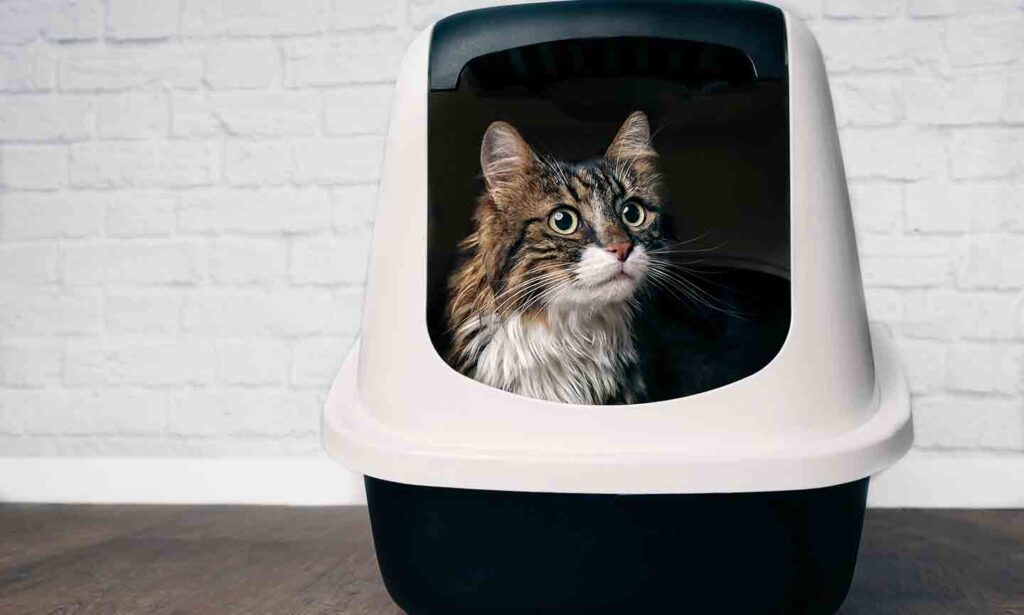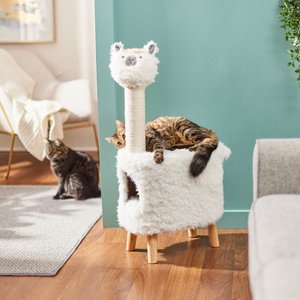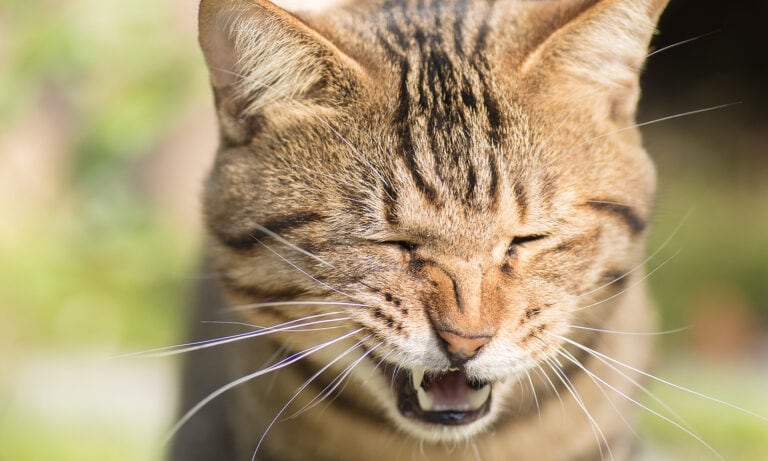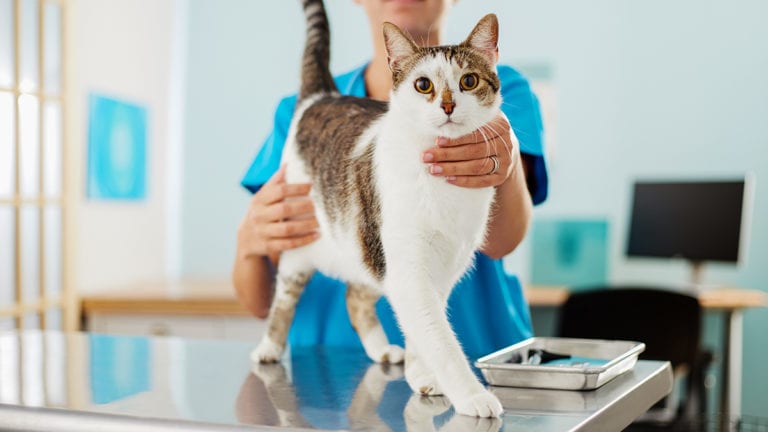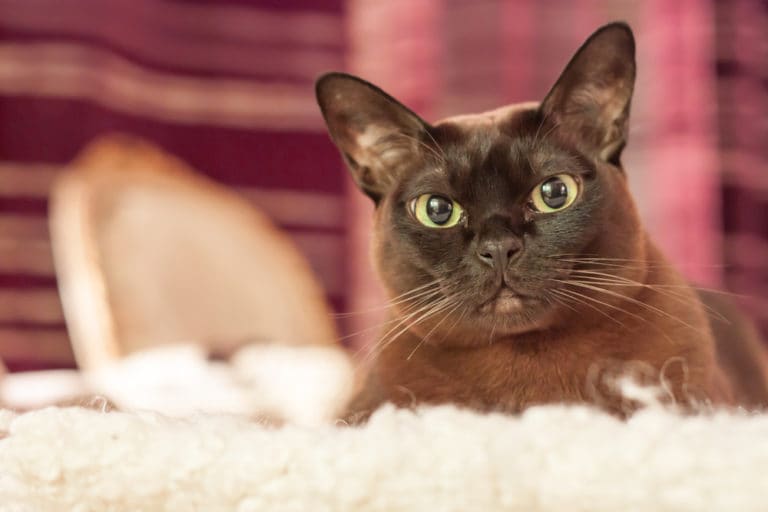Litter box issues are a key indicator of developing health problems in cats. Urinating more or less often, peeing outside the litter box or experiencing difficult or painful urination are all signs that something might be seriously wrong. Unfortunately, an accurate diagnosis can be difficult to pin down, especially when the symptoms of so many urinary conditions overlap.
When there is no identifiable cause for urinary troubles and no other diagnosis seems to fit, veterinarians often use the term “feline idiopathic cystitis” or FIC. Here’s what you need to know about this chronic condition and how to help a cat who has it.
In This Guide
What Is Feline Idiopathic Cystitis (FIC) in Cats?
Urinary issues in cats are frequently lumped under the blanket term “feline lower urinary tract disease” (FLUTD). Common symptoms of FLUTD—typically referred to as lower urinary tract signs or LUTS—include changes in the following:
- How often a cat pees
- The volume of urine produced
- The urine’s color or appearance
Signs of FLUTD may also include abnormal behaviors a cat exhibits while peeing, such as straining to urinate or crying out while doing so.
When a disease or cluster of symptoms can’t be linked to a specific cause, the condition is considered to be idiopathic—as is the case with feline idiopathic cystitis. Dr. Raymond Spragley, DVM, a veterinarian at Zen Dog Veterinary Care in Tuckahoe, New York, describes feline idiopathic cystitis as “a lower urinary tract disease that causes inflammation in a cat’s bladder.”
In other words, FIC is a term used to describe bladder inflammation in cats that has no identifiable cause.
Idiopathic Cystitis vs. Interstitial Cystitis
Like many feline health problems, idiopathic cystitis is known by several other names. According to the Merck Veterinary Manual, it can also be called “idiopathic feline lower urinary tract disease” (iFLUTD). Some vets also use the term “Pandora syndrome.”
“Pandora syndrome,” like FLUTD, is a catch-all term used when multiple organ systems are implicated but none can be identified as the underlying cause of a cat’s symptoms. This term also takes into account non-biological contributing factors such as environmental stressors.
In scientific studies conducted prior to the 2010s, the word “interstitial” was often used instead of “idiopathic” due to similarities between FIC and interstitial cystitis (IC) in humans. In humans, interstitial cystitis is a chronic, painful bladder condition often mistaken for urinary tract infection (UTI).
Like many vets, Dr. Sarah Wooten, DVM, CVJ, a veterinarian in Silverthorne, Colorado, suggests the terms “feline idiopathic cystitis” and “feline interstitial cystitis” can be used interchangeably. She defines FIC as “a stress disorder that manifests in bladder inflammation.”
Dr. Spragley agrees that the two terms can be used interchangeably but offers one point of clarification in terminology. “‘Interstitial’ refers to the inflammation being present between the cells of the bladder,” he says, “while ‘idiopathic’ refers to the disease not having a definitive known cause.”
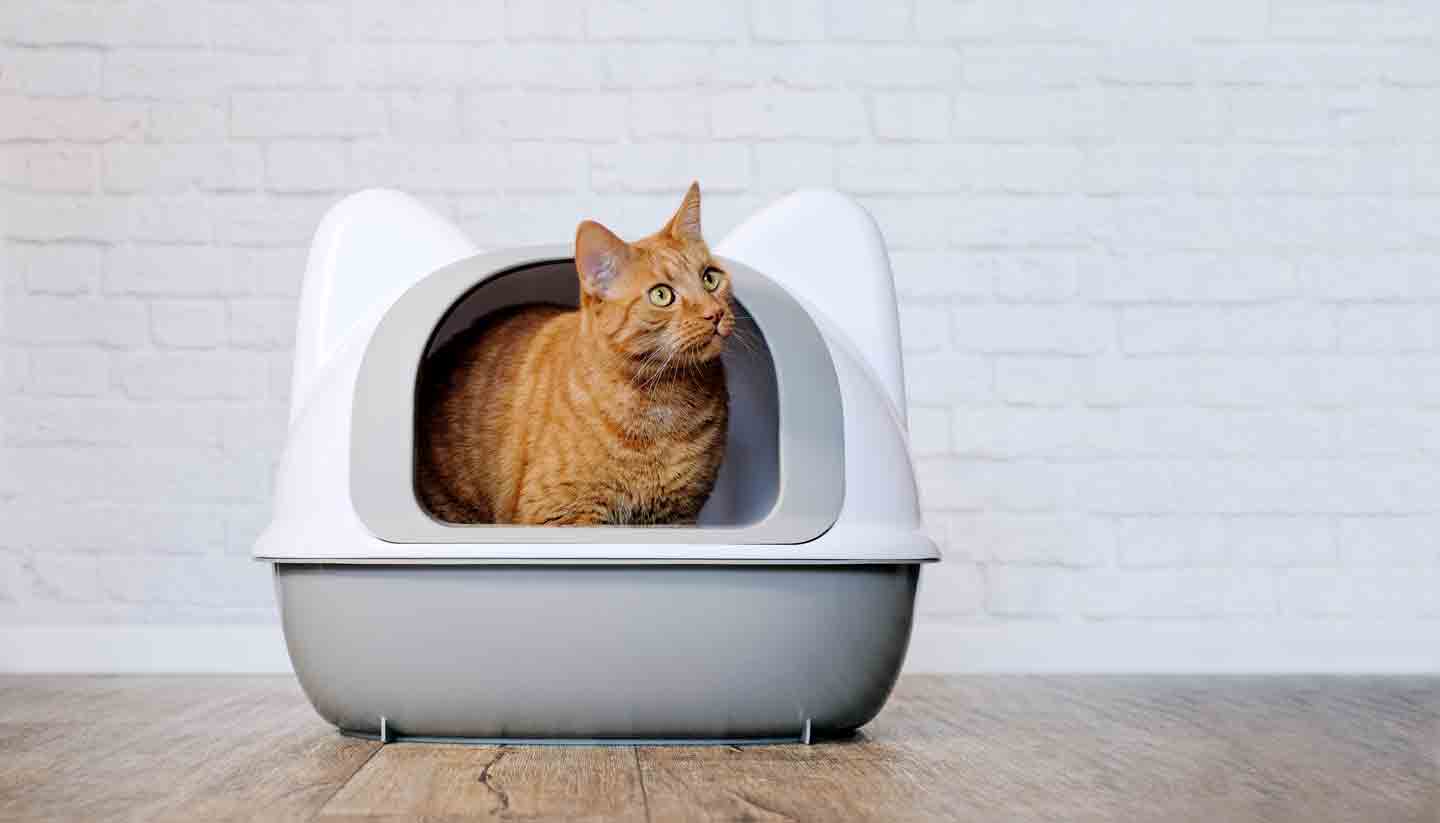
What Causes Feline Idiopathic Cystitis in Cats?
By definition, FIC has no known cause—that’s where the term “idiopathic” comes in. More specifically, however, it’s an exclusionary diagnosis. Vets use the term “FIC” for cases of FLUTD where affected cats experience bladder inflammation but common urinary issues have all been ruled out.
Some common causes of FLUTD in cats include:
- Bacterial infection
- Bladder stones, aka urinary blockage
- Trauma
- Neurologic disorders, aka disorders of the nervous system
- Anatomical abnormalities
- Tumors
When a veterinarian has ruled out all of the above issues, as well as any other underlying cause, it generally leads to a diagnosis of FIC.

Feline Idiopathic Cystitis (FIC) Symptoms
While any cat can develop idiopathic cystitis, the issue is most common in young to middle-aged cats. Symptoms vary but often include litter box problems such as:
- Frequent urination
- Peeing in inappropriate locations
- Straining to urinate
- Vocalizing while urinating
Many cats exhibit non-urinary symptoms such as lethargy, loss of appetite, increased aggression or hiding behavior, as well.
Despite how it manifests, at its core, FIC can more accurately be described as a stress disorder rather than a urinary one.
In many cats with idiopathic cystitis, symptoms come and go. According to the Merck Veterinary Manual, symptoms typically resolve in two to seven days but about half of cats with FIC will experience another incidence within 12 months. The recurrent nature of FIC is a major clue that the condition is linked to a stress response.
Let’s take a closer look at some of the most common signs of FIC in cats.
Pollakiuria (Frequent Urination)
Many cats with FIC experience an increased urge to urinate, often without increased water intake. The result is frequent release of small amounts of highly concentrated urine.
Hematuria (Blood in the Urine)
Blood in the urine can result from a wide array of issues, including urinary tract infections, bladder stones and bladder cancer. In male cats with FIC, hematuria can also be related to urinary tract obstruction, which can be a medical emergency.
Urinating in Inappropriate Locations
Cats avoid the litter box for many reasons but, outside of medical causes like urinary tract infections, stress is a common link. In multi-cat households, peeing outside the litter box can be a form of territorial marking. It can also be an indicator that the cat doesn’t like something about the litter box—the type of litter, the size or shape of the box itself or its lack of cleanliness.
Straining or Crying While Urinating
Crying out while urinating often indicates that a cat is experiencing painful urination, or dysuria. Especially if your cat is visiting the litter box more often than usual, check to see whether they’re actually peeing or not. Straining to urinate may indicate bladder inflammation or a dangerous obstruction.
Inability to Urinate
If your cat is unable to urinate, consider it a medical emergency. This is often caused by urinary obstructions like bladder stones or urinary crystals but can also be related to neurological or anatomical issues. See your vet immediately if your cat is not peeing.
Behavioral Changes
When urinary symptoms can’t be linked to an underlying medical cause, cat parents should look for changes in their cat’s behavior—especially those that might indicate a response to stress. When stressed or anxious, cats may hide more often than usual, respond aggressively or show less interest in food.
Diagnosing FIC in Cats
When a cat stops using the litter box, inexperienced cat parents can be quick to assume it is a behavioral issue. In fact, litter box avoidance is often cited as a primary reason for euthanasia and abandonment of cats. In reality, inappropriate soiling is often a stress reaction and, in such cases, can be resolved by reducing or eliminating stressors in the cat’s environment.
Though the condition is usually triggered by stress, diagnosing FIC involves first eliminating medical causes for a cat’s urinary concerns. “Generally speaking,” says Dr. Wooten, “Vets will use an oral history from the [cat parent], a physical examination, a urinalysis, a urine culture, radiographs (X-rays) and an abdominal ultrasound.”
If your veterinarian cannot identify a medical cause for your cat’s urinary issues, it’s time to shift the focus to environmental triggers. Significant changes to their routine or environment can be incredibly stressful for cats, and that stress often manifests through behavioral issues, litter box problems and changes in appetite.
Treatment of Idiopathic Cystitis in Cats
Because the cause of FIC is unknown, the Merck Veterinary Manual suggests, “The goal of treatment is to reduce the severity and frequency of episodes.” This may require a two-pronged approach of treating the cat’s physical symptoms and making changes to the environment to mitigate stress and prevent future episodes of FIC.
Dr. Spragley says, “Treatment of FIC typically starts with pain relief.” Depending on the cat’s level of pain, he typically recommends analgesics like gabapentin or buprenorphine. Some cats may also benefit from non-steroidal anti-inflammatory drugs (NSAIDs) to decrease inflammation in the bladder or anxiolytic drugs to manage acute anxiety.
Making changes to your cat’s environment, routine or diet may also help alleviate the pain and stress associated with FIC. Veterinary experts often recommend the following steps for cats with FIC—but before making any major changes to your cat's diet, including supplements, talk to your vet. They'll have the best insight into what your unique kitty needs.
- If your cat eats dry food, switch to wet/canned food. Increasing your cat’s moisture intake may help improve urinary health and prevent issues like bladder stones.
- Set up a pheromone diffuser, such as Feliway, to soothe anxiety and mitigate territorial disputes in multi-cat households.
- Increase your cat’s intake of omega-3 fatty acids and antioxidants through dietary changes or supplements to help reduce inflammation.
- Provide outlets such as cat trees and scratching posts for your cat to indulge in instinctual behaviors like climbing and scratching.
- Take steps to help overweight or obese cats achieve and maintain a healthy weight and body condition.
While making changes to your cat’s routine or diet may be instrumental in resolving symptoms of FIC, maintaining consistency is key for preventing future episodes. If your veterinarian recommends dietary changes, keep your cat’s new diet as stable as possible to avoid causing stress that might trigger another episode.
Managing Feline Idiopathic Cystitis in Cats
“Following acute treatment of FIC,” says Dr. Spragley, “at-home management is critical to prevent flare-ups.” While FIC might not affect your cat’s lifespan, Dr. Spragley notes that most cats “will have recurrent episodes throughout their life and will do well if those episodes are treated quickly.”
Monitoring your cat for clinical signs of FIC will be an ongoing task. Long-term treatment with analgesics, anti-inflammatories or anxiolytics may also be indicated for some cats, but stress relief is the most important element in the management of FIC.
Cat behaviorists often recommend multimodal environmental modification as a strategy for the long-term management of FIC. It’s all about making your cat’s life more stimulating while keeping their environment and routine as stable as possible. Daily play sessions, interactive toys and food puzzles, scratching posts and cat trees can all help stave off stress by keeping your cat’s mind and body active and occupied.
As noted by the Cornell College of Veterinary Medicine, changes in diet can trigger a recurrence of FIC episodes in some cats. In addition to keeping your cat’s daily routine and environment consistent, it’s important to keep their diet and feeding schedule stable as well.
Prognosis of FIC in Cats
So, can cats with FIC still live happy lives? The prognosis for cats with idiopathic cystitis is generally good. Prompt treatment will reduce the risk of urinary complications, while stress reduction strategies will keep your cat happier and healthier in the long term.
Dr. Monica Sterk, DVM, the Regional Medical Director at Veterinary Emergency Group in New York City, says that FIC is “a condition that can sometimes wax and wane.” Many cats improve significantly with treatment, but it’s still important to “monitor litter boxes closely, keep cats as least stressed as possible and continue regular visits with your veterinarian.”
Frequently Asked Questions About FIC in Cats
Q:
Is cat cystitis an emergency?
Q:
Is there a natural treatment for feline idiopathic cystitis?
Q:
Should I give water to a cat with FIC?
Q:
What is the life expectancy for feline idiopathic cystitis in cats?
Consistency in your cat’s routine and environmental enrichment is key in treating, managing and preventing recurrences of FIC. Looking for more ways to increase your cat’s water intake? Learn how to get a cat to drink more water.
Expert input provided by Dr. Raymond Spragley, DVM, CVA, CCRT, Veterinarian at Zen Dog Veterinary Care in Tuckahoe, New York; Dr. Sarah Wooten, DVM, CVJ, Certified Veterinary Journalist in Silverthorne, Colorado; and Dr. Monica Sterk, DVM, Regional Medical Director at Veterinary Emergency Group in New York, New York.
Managing Cat Urinary Health
Share:
